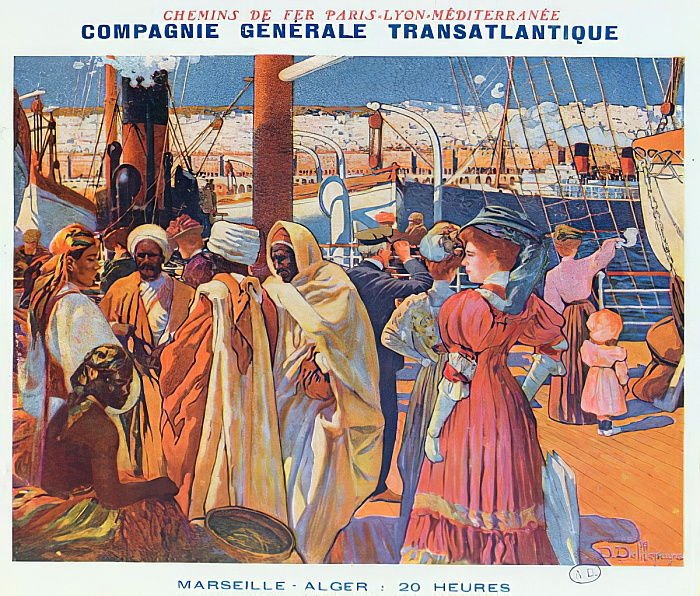-

Articles, Chapters, Essays
Accepted/forthcoming… ''Empire on the Line: Shipping Corporations and French Colonialism ‘beyond Suez,’ 1850-1940,” Journal of Modern History.
And... "Half the Battle: Journeying West of Suez in the First World War," chapter in the volume that I’m co-editing, Into the Fire: Grand Strategies of the First World War.
Out in 2024... “Effervescent Seas: Racialized Labor and Mobile Militancy on the Steamship Highways of the French Indo-Pacific.” French Historical Studies, Vol. 47, No. 3 (August 2024). Read it here (made available and free by Duke UP until July 2025)
— Winner of the 2025 Koren Prize, Society for French Historical Studies
— Winner of the 2025 Society of Dix-Neuviémistes Publication Prize.
Coming soon... “Regulating and Controlling Mobilities,” in A Cultural History of Transport and Mobility, Volume 4: The Age of Steam, ed. Frances Steel (Bloomsbury, 2025)
Out in Dec. 2025... “‘Le chef-lieu d’arrondissement maritime de tout l’Extrême-Orient’ : l’Inscription maritime de Sài Gòn et les crises de l’impérialisme français au début du XXe siècle,” in Du port au monde. Une histoire globale des ports indochinois, eds. S. Le Galloudec, T.H Nguyen, J.F. Klein (Presses universitaires de Nouvelle-Aquitaine, 2025)
Before that... “Les Messageries maritimes au-delà de Suez au début du XXe siècle : souveraineté et luttes syndicales dans les zones grises de l’Empire français.”Revue d’histoire maritime 33 (8/2023): 107-122. Read with open access through Sorbonne UP.
And before that... “Anti-labour repression in the in-between spaces of empire. The Compagnie des Messageries Maritimes and the steamship workers of the ‘China Line’ (1900–20),” in Corporate Policing, Yellow Unionism, and Strikebreaking, 1890-1930: In Defence of Freedom, eds. M. Milan and A. Saluppo (New York: Routledge. 2021), 117-133. (review) (review)
Blogs and Essays…
- “Connecting the French Empire.” Teaching Module in World History Commons.
- “In-between Empires: Steaming the Trans-Suez Highways of French Imperialism (1830s-1930s),” in the Merchant Marines at the Heart of Globalization Blog (MARCOMO)
- “Floating Neighbourhoods: Living Together in the ‘east of Suez’ ships of the French and British Empires, 1870s-1930s,” in the Mobile Domesticities Blog.
- “Engineering Imperialism,” in Past & Present Blog.
-

Book Projects
My first book, Empire on the Line: Mobility, Politics, and the Ocean Corridors of French Colonialism, 1850-1950 (under contract with Cornell UP), explores the transoceanic routes that connected France to its 19th and 20th-century colonies in Asia and Africa. These routes are often imagined only as logistical pipelines in an age of steam and coal. As the book shows, though, oceanic corridors ‘east of Suez’ were also remarkably tough places to govern. The many empires that crowded into these narrow sea lanes faced the challenges of connectivity: from solving impossibly complex questions of jurisdiction to stamping out disease; and from policing passengers to controlling the multi-racial proletariat that kept shipping lines running. Though authorities tried to contain the fractious politics of these maritime highways, ultimately they could not prevent a wave of illicit migration, labor militancy, smuggling, and anticolonial activism from washing onto Europe’s shores.
I’m also co-editing a volume with Paul Kennedy and John Maurer on the coordination of political, economic, and military strategies during the First World War and its aftermath, tentatively titled: Into the Fire: Grand Strategies of the First World War (Georgetown UP).
My next book project explores the invention of “the Indo-Pacific” as a geographical concept. That term is typically understood as a 21st-century neologism tailor-made for a new era of great power rivalry. My project, by contrast, traces the roots of this regionalization to late-19th and early-20th century developments, from the rise of geopolitics as field of study to the industrialization of mobility.
-

A Web of Research
Here are a few of the places where my research is cited:
Arnaud Orain on the geopolitics of capitalism and the intellectual history of finitude; Vanessa Ogle on the shadowy world of the modern shipping industry; Charles Keith on travel and the co-construction of France and Indochina; Tara Zahra on migration and global histories of Europe; Peter Kwok-Fai Law on China’s 20th-century shipping industry; Stéphanie Soubrier on the labor politics of seafarers in the French Empire; Isacar Bolaños on engineering and the French presence in Ottoman Iraq; François Drémeaux on intimacy in transit among colonial travelers; Elisa Camiscioli on 20th-century debates over trafficking and the selling of ‘French sex.’
The 2025 Sherman Emerging Scholar Prize Lecture: “Empire on the Line: Making and Breaking French Colonialism at Sea,” UNC Wilmington, October 15. Announcement / Event link
Beyond France Seminar, “Floating City: Urbanity between Empires, 1870-1930,” Columbia University, April 24 2026.